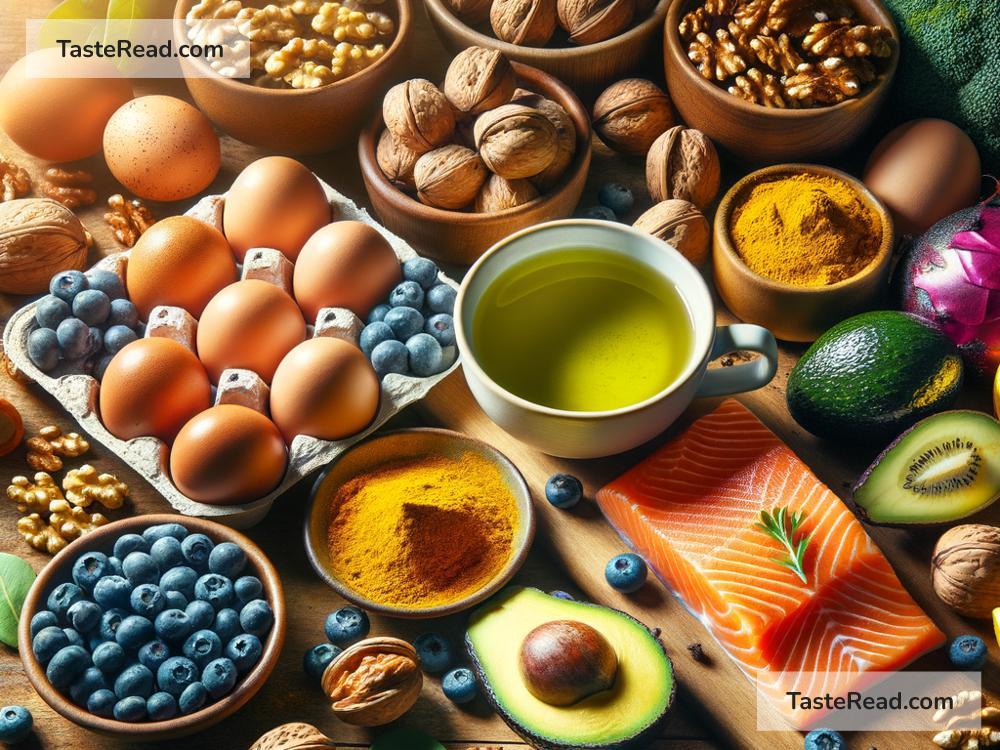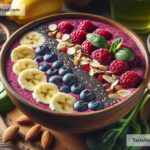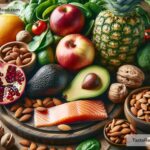Foods That Enhance Reflexes: Eat Your Way to Faster Responses
Imagine you’re catching a ball that’s flying straight at you. Or maybe you’re dodging someone in a crowded hallway. What allows you to act so fast? Your reflexes! They’re your body’s natural response to sudden situations. While practice and mental focus can boost your reflexes, did you know that the food you eat can also play a big role? The right diet can sharpen your mind, improve coordination, and help your body respond more efficiently. Let’s dive into some foods that can help you react faster and perform better.
1. Nuts and Seeds: Brain Boosters
Nuts and seeds are tiny powerhouses packed with nutrients that your brain loves. Almonds, walnuts, sunflower seeds, and flaxseeds are rich in omega-3 fatty acids, magnesium, and vitamin E. Omega-3s help keep your nerves healthy and improve communication between your brain and muscles, which is essential for quick reflexes. Vitamin E protects your brain from mental decline, ensuring you stay sharp for longer.
Snack on a handful of mixed nuts or sprinkle seeds on your morning yogurt or smoothie bowl. Not only will you boost your reflexes, but you’ll also enjoy sustained energy throughout the day.
2. Leafy Green Vegetables: Nature’s Superfood
Leafy greens, such as spinach, kale, and broccoli, are packed with nutrients like iron, folate, and vitamin K. Iron improves oxygen flow to your brain, keeping it running at its best. Folate and vitamin K are critical for brain health and cognitive functions. A healthy brain allows you to process signals faster, which means better reflexes!
Use leafy greens in salads, smoothies, or soups. Your brain (and body) will thank you for the healthy dose of greens.
3. Fatty Fish: Omega-3 Central
If there’s one food group famous for supporting the brain and nervous system, it’s fatty fish. Salmon, mackerel, sardines, and trout are rich in omega-3 fatty acids, which improve communication among brain cells and nerve endings. These benefits don’t just help reflexes, but they also enhance coordination and focus.
Don’t like fish? No worries—there are alternatives! Try fish oil supplements or plant-based omega-3 sources like chia seeds and walnuts.
4. Eggs: Energy for the Brain
Eggs are an excellent source of protein and choline, a compound that supports brain health and memory. Choline helps your body produce acetylcholine, a neurotransmitter that plays a key role in muscle activation and processing signals. The better your brain-body connection, the faster your reaction times.
Enjoy eggs in different ways—scrambled, boiled, or even baked. They’re affordable, versatile, and packed with reflex-enhancing nutrients.
5. Bananas: A Muscle-Friendly Fruit
Bananas are not just delicious and easy to eat; they’re also rich in potassium. Potassium plays a big role in muscle function by helping your nervous system send signals to your muscles. This is extremely important for quick movements and coordination.
Eat a banana as a quick snack, blend it into a smoothie, or slice it over your cereal to stay energized and ready to react.
6. Dark Chocolate: Sweet Brain Fuel
Yes, chocolate can be good for you—when it’s dark! Dark chocolate contains antioxidants and flavonoids that improve blood flow to the brain. This increased blood flow boosts focus, memory, and decision-making, allowing you to respond to situations more quickly. Plus, the small amount of caffeine in dark chocolate provides an energy kick.
Choose dark chocolate that’s at least 70% cocoa to avoid excess sugar, and enjoy it in moderation for maximum benefit.
7. Blueberries: Tiny Antioxidant Heroes
Blueberries are loaded with antioxidants that protect your brain from damage and keep your mental faculties sharp. Studies have shown that blueberries can improve coordination, memory, and cognitive function. Adding these little berries to your meal plan can make your mind more capable of responding to challenges.
Enjoy blueberries fresh, add them to oatmeal, or blend them into a smoothie for a delicious brain boost.
8. Whole Grains: Fuel for the Brain
Whole grains like oats, quinoa, and brown rice are excellent sources of complex carbohydrates. These carbs provide slow-releasing energy, ensuring that your brain stays alert throughout the day. When your brain has a steady supply of energy, your reflexes remain quick and sharp.
Swap white bread and refined grains for whole-grain versions to keep your reactions fast and your energy steady all day long.
9. Avocado: Healthy Fat for Better Focus
Avocados are rich in healthy monounsaturated fats that improve blood flow to the brain. Better blood flow means faster and more accurate responses from the nervous system. They also contain vitamin B, which supports brain function and helps manage stress—a factor that can slow your reflexes.
Add avocado slices to your salads, sandwiches, or toast for a creamy, reflex-enhancing treat.
Conclusion: Reflexes, Nutrition, and You
Your reflexes depend on a well-coordinated connection between your brain and body. To keep them sharp, focus on foods that boost brain health, muscle function, and nervous system efficiency. From nuts and leafy greens to eggs and blueberries, the choices are endless. Remember, a balanced diet packed with these nutrient-filled foods can help you react faster and stay more focused, whether you’re on the sports field or just navigating daily life.
So, next time you’re preparing a meal, think reflex-friendly. Your body—and your quick reactions—will thank you!


